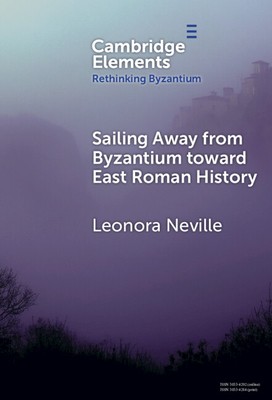
- We will send in 10–14 business days.
- Author: Leonora Neville
- Publisher: Cambridge University Press
- ISBN-10: 1009595555
- ISBN-13: 9781009595551
- Format: 15.2 x 22.9 x 0.6 cm, kieti viršeliai
- Language: English
- SAVE -10% with code: EXTRA
Sailing Away from Byzantium Toward East Roman History (e-book) (used book) | bookbook.eu
Reviews
Description
Although the first thing one learns about the 'Byzantine Empire' is that it was really the eastern Roman empire, scholars have preferred to call it 'Byzantine' in a repudiation of the self-conception and emic vocabulary of the inhabitants of that polity. The terminology of 'Byzantium' artificially severs the 'medieval' eastern Roman empire from its 'classical' roots allowing for the fundamentally Eurocentric schematization of history into 'ancient, ' 'medieval, ' and 'Renaissance' periods. 'Byzantine' is not a benign term of art but has served a variety of political and historiographical agendas including maintaining nationalist visions of ethnic continuity, creating precedents for communism, enabling politics of nostalgia for Orthodox dominion, and constructing visions of western European superiority and masculinity that justify colonialism. By exploring these intellectual legacies of 'Byzantium, ' and the benefits of conceptualizing Roman history as an unsevered whole, this Element exhorts scholars to let go of the 'Byzantine' misnomer.
EXTRA 10 % discount with code: EXTRA
The promotion ends in 21d.20:47:51
The discount code is valid when purchasing from 10 €. Discounts do not stack.
- Author: Leonora Neville
- Publisher: Cambridge University Press
- ISBN-10: 1009595555
- ISBN-13: 9781009595551
- Format: 15.2 x 22.9 x 0.6 cm, kieti viršeliai
- Language: English English
Although the first thing one learns about the 'Byzantine Empire' is that it was really the eastern Roman empire, scholars have preferred to call it 'Byzantine' in a repudiation of the self-conception and emic vocabulary of the inhabitants of that polity. The terminology of 'Byzantium' artificially severs the 'medieval' eastern Roman empire from its 'classical' roots allowing for the fundamentally Eurocentric schematization of history into 'ancient, ' 'medieval, ' and 'Renaissance' periods. 'Byzantine' is not a benign term of art but has served a variety of political and historiographical agendas including maintaining nationalist visions of ethnic continuity, creating precedents for communism, enabling politics of nostalgia for Orthodox dominion, and constructing visions of western European superiority and masculinity that justify colonialism. By exploring these intellectual legacies of 'Byzantium, ' and the benefits of conceptualizing Roman history as an unsevered whole, this Element exhorts scholars to let go of the 'Byzantine' misnomer.


Reviews